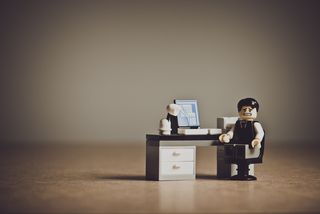Productivity
10 Simple Productivity Hacks to Get Through A Bad Day
We cannot anticipate a bad day but we can have a strategy to survive one.
Posted November 13, 2019 Reviewed by Kaja Perina

Everyone goes through that phase when all the odds seem to play against you. Some people often struggle to get things done when they are having a bad day largely because they obsess over things that went wrong. A conversation that turned into a misunderstanding plays in an endless loop wondering, what if they had said this instead of that, would things have turned out differently? However, deadlines don’t postpone themselves, and important tasks still require attention although you are emotionally unsettled. It’s hard to complete tasks, but there are simple hacks that you can try out to hack your productivity on a bad day.
Take a breather.
Breathe. After a dramatic argument or just a general experience of a negative emotion take a few minutes to take deep breaths. Deep breaths have a calming effect, it slows down your heartbeat, which slows down your blood pressure, allowing you to be in a more calm and conducive emotional state. It may not make you feel like a million bucks, but it will bring back your metabolism to a normal rate, which is a good start.
Find joy in what you love.
Certain things always make you feel better when you are having a bad day. It could be a song or a game on your phone. Create a few minutes to do this thing you love. I love to be in nature when things aren’t playing out very well; I take a mindful walk around the neighborhood. Realize I said ‘Mindful’ meaning I allow myself to be in the present. Doing something you love can distract you from the things that are bothering you to shift your focus on more positive things. A momentary distraction is okay.
Plan your work.
Although here and there, the unfortunate circumstance may pop up in your head, this is normal. However, make a mental note that you will attend to the thought later. In a calmer state, it is much easier to negotiate with our minds on what to focus on. You may have already planned your work the previous night or in the morning, but this was probably before things had gone south and you may need to adjust. It is therefore essential to pick out the most important tasks that have to be done that day. Everything else can wait for another day when you are feeling better emotionally. Break these tasks into small easy-to-do actions so they do not look overwhelming. For instance, if you have a report that is due, break it down into sections. Work on each section and allow yourself to take breaks in between to gather your strength for the next task.
Avoid communication.
Unless it is necessary, try to stay away from your phone. This is because it can distract you and sometimes drive you back to the situation you are trying to distract yourself from. I know sometimes you just want to talk to someone about what has just transpired or what is going on so you can feel better, but sometimes conversations can go on for hours defeating the whole purpose of you being productive. Minimize your communication to only what is necessary, that way, you also minimize reacting the wrong way to messages. Also, avoid social media, it can make you feel like your life really sucks but no one ever really posts a bad day, so protect your mind when it is fragile.
Listen to something uplifting.
I have a playlist that is meant for the times I feel down. Music has this power to raise your vibration when you are low and sometimes having a good playlist in the background can help you feel better. If you are in a shared office space, you can plug in your earphones and listen to some nice jams. Make sure you have a volume that allows you to interact with other coworkers if you are working on a task that needs interaction. Plugging in one earphone may also be more polite towards others. Playing music while you work will also work for tasks that do not require all your attention.
Stay hydrated.
Dehydration is the worst condition you can add to a bad mood. Staying hydrated energizes you and helps you feel refreshed, which will also help uplift your mood.
Don’t miss meals.
Just as much as dehydration can make you feel worse about your situation, an empty stomach will make you more irritable. Spoil yourself to a good breakfast or lunch and keep yourself nourished. Nourishment is also a good way to elevate your mood. Food aromas are also therapeutic.
Reward small wins.
After finishing a big task or a section of a report. Treat yourself to something nice like a piece of candy or anything that makes you feel happy. It is a way of motivating yourself to carry on and if you are being productive on a bad day; you deserve a prize.
Do things at your own pace.
Keep in mind that you are not your normal self, so be kind to yourself. Do what you can when you can. We rarely realize that when your spirit is down, it also counts as you not feeling well. You are not as healthy as you should be because mental health is a big aspect of your health. So it makes sense to say that you are not feeling well and you need not explain yourself. Just don’t be dramatic about it.
Change your environment.
In a flexible working setup, you can also consider working from a different place like the park or your favorite coffee spot. This can make a huge difference in your mood. If you are not in a flexible working environment, a few tweaks like moving your chair closer to the window or a sunny spot can help readjust your focus. Even a small desk rearrangement can make a big difference.




